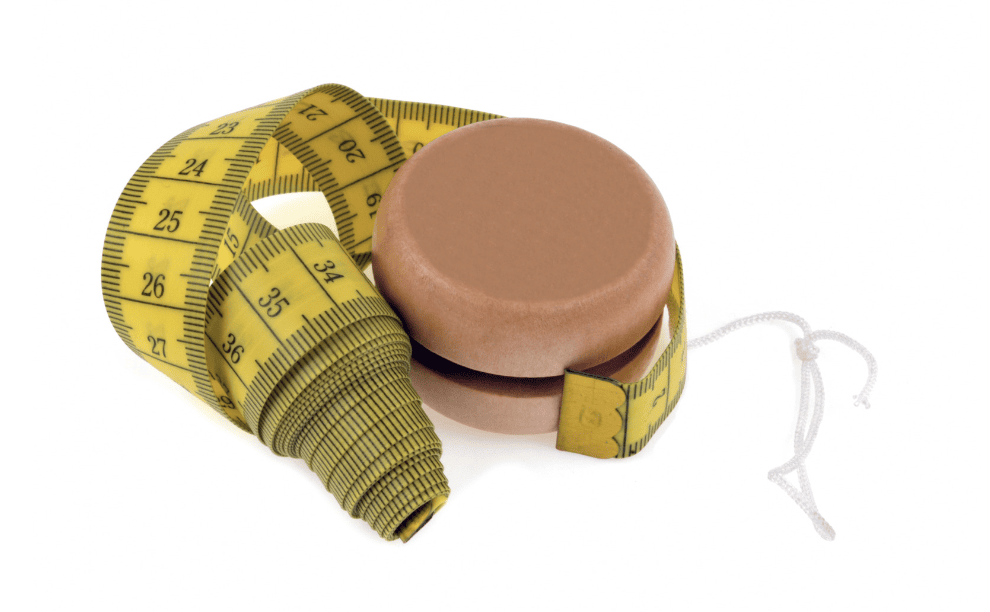Breaking The Rubber Band: Escaping the Cycle of Yo-Yo Dieting
If you’ve ever used a diet to lose weight, like WeightWatchers or Noom for example, you understand how difficult it can be to keep the weight off. This scenario is not uncommon – in fact, it even has a name.
The “rubber band effect” refers to the cycle of losing weight on a diet, maintaining it for a short period of time, and gaining weight back once the diet ends. This creates a “yo-yo” pattern of weight loss and gain.
It’s called the rubber band effect because, much like a stretched rubber band springs back, people’s weight often snaps back after restrictive dieting. There are many physiological and psychological reasons for the rubber band effect.
Let’s discuss the science behind the rubber band effect and how Fresh Tri’s Iterative Mindset Method™ prevents the rebound.
The Science Behind the Bounce
The physiological factors behind the rubber band effect make the body prone to regaining weight, and psychological factors influence behaviors that contribute to weight rebound after dieting.
Physiological Factors
Our bodies are prone to regaining weight due to:
- Metabolic Adaptation: When you lose weight, your body’s metabolism slows down to conserve energy, making it easier to regain the lost weight (and more) when you stop dieting.
- Hormonal Changes: Weight loss can cause shifts in hormones that increase appetite and encourage fat storage, driving overeating.1
- Number of Fat Cells: The amount of fat cells someone has is set during childhood. When you lose weight, the fat cells shrink, but the overall number stays the same, and they are ready to refill if calorie intake increases again.
Psychological Factors
There is some psychology behind the rubber band effect as well.
- Restriction Mindset: Rigid restriction of foods can lead to feelings of deprivation, causing people to overeat for “rebellion” when they stop dieting.
- Loss of External Motivation: People who lose weight for external reasons, like a specific event, often gain it back when that motivation is gone, whereas internal motivation encourages maintenance.
- Stress and Emotional Eating: Issues like stress, anxiety, and depression can derail weight maintenance by driving emotional eating.
- Binary Thinking: Viewing foods as “good” or “bad” can lead to guilt after indulging in “bad” foods, which fuels overeating.
Addressing both sets of issues is important for long-term weight management.
Studies Examining the Rubber Band Effect
There have been many studies examining the rubber band effect in weight loss. Here are a few highlighting the damage that can be done by rigid, restrictive diets.
- A 2016 study in the journal Obesity followed contestants from The Biggest Loser competition and found that 6 years later, they had regained 70% of the weight they had lost on the show’s extreme diet and exercise regimen. This demonstrated a severe long-term rubber band effect.
- Mann et al. (2007)2 looked at dietary records and found that 78% of successful dieters modified their diet periodically to avoid excessive restrictions, indicating this helps avoid rubber band effects after weight loss.
- A meta-analysis by Anderson et al. (2001)3 found that one-third to two-thirds of dieters regained more weight than they lost within 4 or 5 years after a weight loss program. This demonstrates the common rubber band effect pattern.
A Better Way: The Iterative Mindset Method
The Iterative Mindset Method™ (IMM) prevents the rubber band effect by avoiding restrictive dieting in favor of gradual, sustainable lifestyle changes.
The IMM relies on shifting your mindset to control the habenula, the part of your brain responsible for motivation. The three steps of IMM are already steps you incorporate into your everyday decision-making process, whether you know it or not.
The first step – assess. Let’s say we decide to assess our eating habits. Maybe you’ve had a hard day at work, and you come home, open the fridge, and choose the least nutritious option. After dinner, you decide that you don’t feel great and you should make a change to keep yourself from feeling that way again tomorrow.
This is where the next step of IMM happens. You decide to get rid of the foods that don’t make you feel your best, and replace those foods with better options, so that tomorrow, you’ll make a choice that will nourish your body. You’ve tweaked your behavior to set yourself up for finding success. That’s the second step – iteration.
When you next shop for groceries, you skip the foods that don’t allow you to feel your best so the temptation isn’t in the fridge. Instead, you reach for the healthy options. This is the third step of IMM – practice. Practice is where we build habits; our habits get stronger the longer we practice building them.
Hacking Your Habenula for Success
The habenula is a small part of the brain that we like to call the “motivation kill switch.” It regulates dopamine, our “motivation and reward” neurotransmitter. When dopamine is dysregulated, it can impair motivation and make it harder to form new habits.
The IMM utilizes gradual changes to behaviors, controlling dopamine. This repetition and consistency strengthens the neural pathways supporting these new habits over time.
Restrictive diets limit food choices and calories, putting stress on the brain that dysregulates dopamine and activates the habenula. This results in impaired motivation, making forming new habits increasingly difficult.
Break the Rubber Band with Fresh Tri
If you’ve decided that making behavior changes will lead you to a healthier lifestyle but find yourself saying, “I’ve tried everything…” or “That just doesn’t work for me,” now may be the time to remind yourself that hacking your habenula and working towards an iterative mindset can help keep you on course to overcome feelings of failure impeding your progress.
You won’t be alone! The Fresh Tri app, free for everyone to use, comes with a community of “Tri-ers” ready to cheer you on along your journey. Download the app today!
References
- Sumithran, P. et al. (2011) ‘Long-Term Persistence of Hormonal Adaptations to Weight Loss’, New England Journal of Medicine, 365(17), pp. 1597–1604. Available at: https://doi.org/10.1056/nejmoa1105816.
- Mann T, Tomiyama AJ, Westling E, Lew AM, Samuels B, Chatman J. Medicare’s search for effective obesity treatments: diets are not the answer. Am Psychol. 2007 Apr;62(3):220-33. doi: 10.1037/0003-066X.62.3.220. PMID: 17469900.
- Anderson JW, Konz EC, Frederich RC, Wood CL. Long-term weight-loss maintenance: a meta-analysis of US studies. Am J Clin Nutr. 2001 Nov;74(5):579-84. doi: 10.1093/ajcn/74.5.579. PMID: 11684524.












